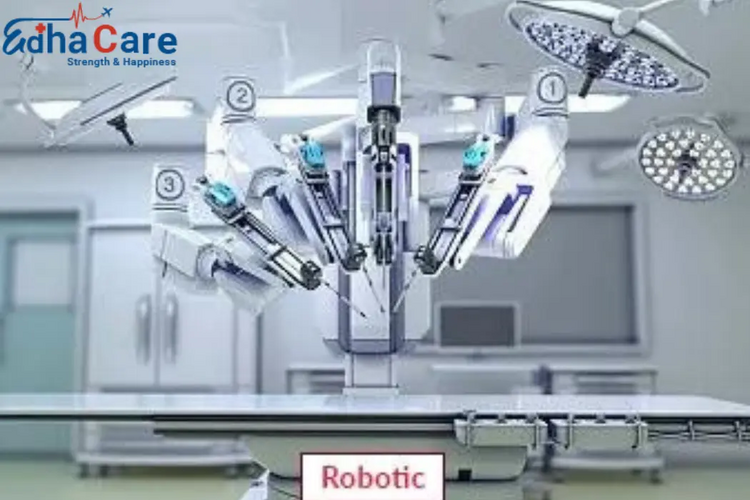Sponsorluk
Transforming Cardiac Care: Robotic Heart Bypass Surgery in India

Robotic Heart Bypass Surgery in India is redefining how cardiac patients are treated, especially those suffering from Coronary Artery Disease (CAD). With technological advancement and a patient-centric approach, this minimally invasive procedure offers faster recovery, fewer complications, and superior precision compared to traditional open-heart surgeries. India is emerging as a global hub for robotic cardiac procedures, thanks to its cutting-edge medical infrastructure, expert cardiac surgeons, and affordable treatment options.
What is Robotic Heart Bypass Surgery?
Robotic heart bypass surgery is a revolutionary procedure that uses robotic technology to perform coronary artery bypass surgery through small incisions without opening the chest. Controlled via a computer console, the robotic arms and instruments offer greater dexterity and precision than the human hand. The surgeon views a high-definition, 3D image of the heart and performs the surgery with enhanced control and minimal invasion.
This method is a game-changer for patients, especially those considered at low to moderate risk, such as elderly individuals or those with diabetes, as it reduces trauma, infection risk, and hospital stay duration.
Who Should Consider Robotic Heart Bypass Surgery?
Patients diagnosed with Coronary Artery Disease (CAD), where the arteries are narrowed or blocked, are ideal candidates. The procedure is especially beneficial for:
-
Patients with single-vessel coronary blockages
-
Those who prefer minimally invasive alternatives
-
Individuals with conditions like obesity or diabetes
-
Elderly patients with increased surgical risks
-
Patients with no prior open-heart surgeries
However, it's not suitable for patients with multiple artery blockages or those with complex cardiac histories.
Types of Robotic Heart Bypass Procedures
-
Totally Endoscopic Coronary Artery Bypass (TECAB):
This technique involves small incisions, with no need to open the chest. It’s ideal for minimal scarring and quicker healing. -
Robotic-Assisted MIDCAB:
A robotic arm assists the surgeon through a small chest incision, making the process precise and less invasive. -
Hybrid Coronary Revascularization:
Combines robotic surgery with angioplasty and stenting for a more comprehensive treatment plan, offering the benefits of both methods.
How Is the Procedure Performed?
Robotic heart bypass surgery involves:
-
Preoperative Preparation: The patient is given general anesthesia, and vital signs are closely monitored.
-
Port Placement: Small incisions (1–2 cm) are made in the chest to insert access ports for the robotic instruments.
-
Robotic System Setup: The surgeon controls robotic arms from a console, using real-time 3D visuals.
-
Bypass Procedure: Grafts (artery or vein) are attached to the blocked artery, rerouting blood flow.
-
Closure: Instruments are removed, and the incisions are closed with minimal scarring.
Risks and Complications
While robotic heart bypass surgery is considered safe, certain risks still exist, including:
-
Minor bleeding
-
Infection at incision sites
-
Irregular heart rhythms
-
Rare need for conversion to open-heart surgery
-
Equipment malfunction (extremely rare)
-
Blood clots
However, these complications are significantly lower compared to traditional surgery, thanks to precision and less trauma.
Post-Surgery Recovery and Care
One of the biggest advantages of robotic heart bypass surgery is the speed of recovery. Here’s what patients can expect:
-
ICU monitoring for 24–48 hours
-
Walking within a day post-surgery
-
Hospital stay of 3–5 days
-
Return to normal activities within 2–3 weeks
-
Continued medication and cardiac rehab for long-term health
-
Regular follow-ups and lifestyle changes (diet, exercise, stress control)
Cost of Robotic Heart Bypass Surgery in India
The Cost of Robotic Heart Bypass Surgery in India ranges between USD 8,000 to USD 15,000, significantly lower than in countries like the US, UK, or UAE. This makes India one of the most sought-after destinations for international patients. The pricing includes:
-
Hospital stay and surgical fees
-
Pre and post-operative care
-
Use of advanced robotic technology
-
Surgeon and consultation fees
The affordability, combined with premium-quality care, ensures that patients receive the best possible outcomes without financial burden.
Why Choose India for Robotic Heart Bypass Surgery?
India offers a compelling combination of medical expertise, affordability, and technological innovation. Here’s why international patients prefer India:
-
World-class hospitals with international accreditations
-
Highly experienced cardiac surgeons and multidisciplinary teams
-
Cutting-edge robotic systems and advanced diagnostics
-
Shorter wait times and seamless medical tourism support
-
Record of achievements like the world’s first remote robotic cardiac telesurgery
-
Affordable packages with post-surgery rehabilitation support
Conclusion
Robotic Heart Bypass Surgery in India is an innovative and effective solution for treating coronary artery disease. With high success rates, minimal complications, and faster recovery, this procedure is transforming the way cardiac care is delivered. India’s affordable healthcare ecosystem, paired with internationally recognized hospitals and skilled surgeons, makes it a top choice for patients across the globe.
Whether you're looking for less pain, quicker recovery, or cost-effective yet high-quality treatment, India provides the perfect destination for advanced cardiac care.



